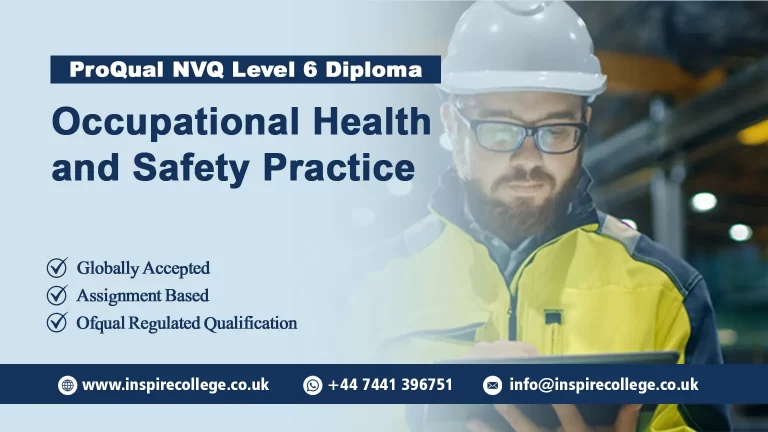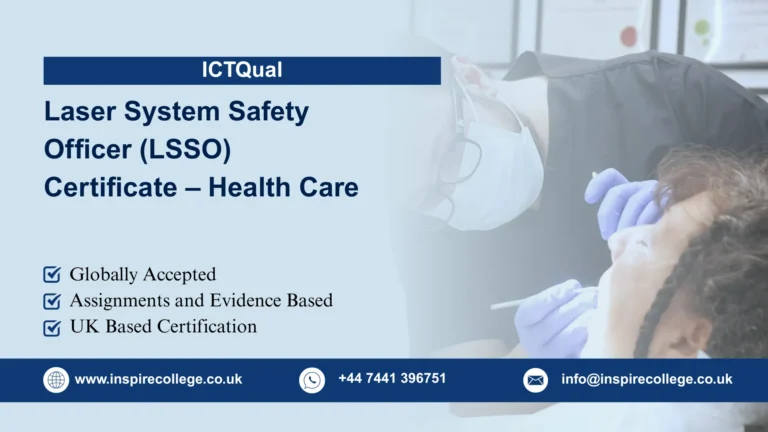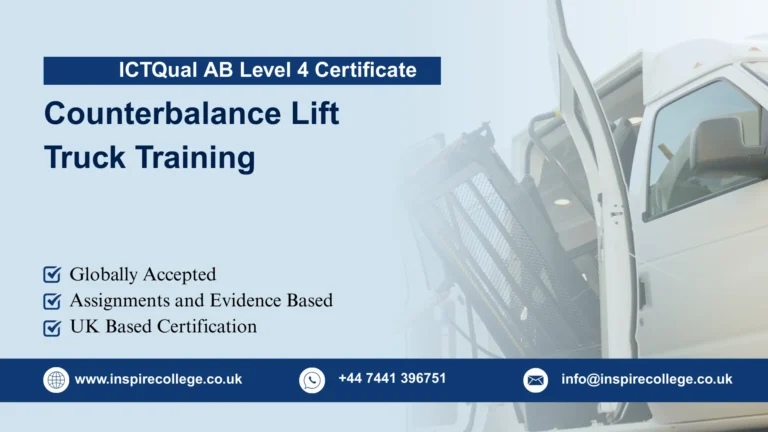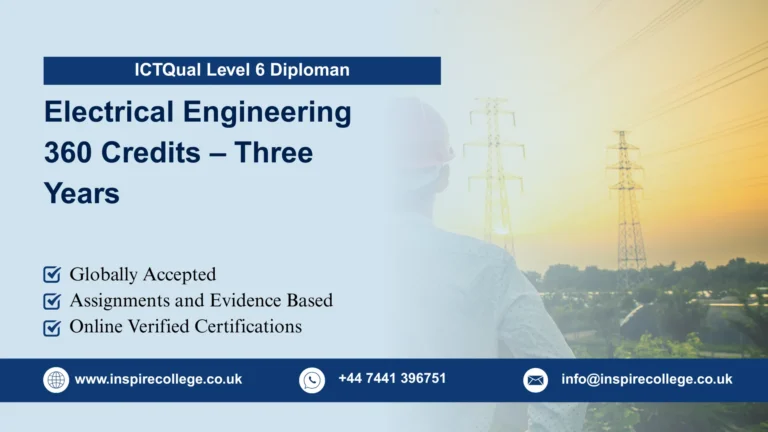
ICTQual AB Level 6 International Diploma in Mining & Metallurgy Engineering
The ICTQual AB Level 6 International Diploma in Mining & Metallurgy Engineering is a globally recognised programme designed to equip learners with advanced knowledge and practical skills in mining operations, mineral processing, and metallurgical engineering. Spanning three years and 360 credits, this diploma provides a comprehensive curriculum tailored for both freshers entering the mining sector and experienced professionals seeking to enhance their expertise.
This diploma delivers a robust foundation in mining engineering principles, mineral exploration, ore extraction, and metallurgical processing techniques. Learners gain hands-on experience in modern mining technologies, safety management, environmental sustainability, and industry best practices. The programme also emphasises critical skills such as risk assessment, project management, process optimisation, and regulatory compliance, preparing graduates to excel in real-world industrial settings.
Upon completion, learners are equipped to pursue a wide range of career opportunities, including Mining Engineer, Metallurgist, Mineral Processing Specialist, Mine Safety Officer, or Project Manager. The qualification also enhances international employability, providing recognition across mining and metallurgical industries worldwide.
Key benefits of this programme include practical, industry-aligned training, advanced technical competencies, and strategic leadership skills, enabling learners to contribute effectively to mining operations, sustainable resource management, and metallurgical innovation. Whether you are beginning your career or aiming to step into senior roles, the ICTQual AB Level 6 International Diploma in Mining & Metallurgy Engineering offers the knowledge, credibility, and global recognition to succeed in today’s competitive mining and engineering sectors.
The ICTQual AB Level 6 International Diploma in Mining & Metallurgy Engineering is designed for learners committed to developing advanced knowledge, technical skills, and professional competence in mining and metallurgical engineering. Entry requirements ensure that learners are prepared to succeed in this comprehensive three-year, 360-credit programme.
Age Requirement
- Learners must be at least 18 years old to enrol in the programme.
Educational Background
- Applicants are expected to have a recognised Level 5 qualification in mining, metallurgy, engineering, geosciences, or related technical fields.
- Equivalent professional certifications or diplomas in industrial operations, mineral processing, or engineering disciplines may also be considered.
- Learners without formal qualifications but with significant verifiable industry experience may be eligible under the experienced professional route.
Professional Experience
- Fresh Learners: Suitable for individuals starting their career in mining or metallurgy, who wish to gain foundational and advanced skills through the full programme.
- Experienced Professionals: Learners with at least 6 years of verifiable work experience in mining operations, mineral processing, metallurgical engineering, or related sectors can apply for recognition of prior learning for fast-tracked certification.
Additional Requirements
- Proficiency in English, both written and spoken, to effectively engage with course materials, assessments, and professional communication.
- Basic computer literacy, including familiarity with Microsoft Office and online learning platforms, for assignments and research projects.
- Commitment to completing the three-year, 360-credit programme, including assignments, case studies, practical tasks, and research projects.
- Strong interest in industrial safety, environmental sustainability, and operational efficiency within mining and metallurgical operations.
This entry profile ensures that learners are well-prepared to handle the technical, theoretical, and practical aspects of the diploma while meeting international industry standards in mining and metallurgy.
Mandatory Units
This qualification, the ICTQual AB Level 6 International Diploma in Mining & Metallurgy Engineering, consists of 36 mandatory units.
Year 1 – Foundation in Mining & Metallurgy Engineering
- Principles of Mining and Metallurgy Engineering
- Engineering Mathematics
- Fundamentals of Mechanical and Electrical Engineering
- Materials Science and Metallurgy
- Engineering Drawing and Computer-Aided Design (CAD)
- Introduction to Mining Geology and Mineralogy
- Basics of Mining Operations and Techniques
- Fundamentals of Ore Processing and Metallurgical Methods
- Health, Safety, and Environmental Practices in Mining
- Introduction to Mining Equipment and Machinery
- Communication and Technical Report Writing
- Introduction to Project Management in Engineering
Year 2 – Intermediate Studies in Mining & Metallurgy Engineering
- Mining Methods and Mine Planning
- Mineral Processing and Extractive Metallurgy
- Rock Mechanics and Geotechnical Engineering
- Advanced Materials and Metallurgical Analysis
- Industrial Automation and Control Systems in Mining
- Mine Surveying and Geomatics Applications
- Industrial Maintenance and Reliability in Mining Operations
- Sustainable Mining Practices and Environmental Management
- Applied Research Methods in Mining and Metallurgy
- Mining Economics and Cost Control
- Project Planning and Mine Operations Management
- Health, Safety, and Risk Management in Metallurgy
Year 3 – Advanced Studies in Mining & Metallurgy Engineering
- Advanced Mining Techniques and Underground Operations
- Advanced Metallurgical Processes and Simulation
- Mineral Resource Evaluation and Optimisation
- Mine Ventilation and Environmental Control Systems
- Smart Mining Technologies and Industry 4.0 Applications
- Robotics and Automation in Mining and Metallurgy
- Cyber-Physical Systems and IoT in Mining Operations
- Professional Ethics and Sustainability in Mining Engineering
- Innovation and Entrepreneurship in Mining & Metallurgy
- Infrastructure and Facility Planning for Mining Projects
- Advanced Research and Analytical Techniques in Metallurgy
- Final Year Major Project (Capstone Project)
Learning Outcomes for the ICTQual AB Level 6 International Diploma in Mining & Metallurgy Engineering:
Year 1 – Foundation in Mining & Metallurgy Engineering
Principles of Mining and Metallurgy Engineering
- Understand the core principles and scope of mining and metallurgical engineering.
- Explain fundamental processes in mineral extraction and metallurgical operations.
- Identify key roles and responsibilities of engineers in mining projects.
- Apply basic engineering concepts to mining and metallurgy scenarios.
Engineering Mathematics
- Solve engineering problems using algebra, calculus, and statistics.
- Apply mathematical models to mining and metallurgical operations.
- Interpret and analyse engineering data quantitatively.
- Develop problem-solving skills for practical engineering applications.
Fundamentals of Mechanical and Electrical Engineering
- Understand basic mechanical and electrical engineering principles.
- Explain the function of machinery and electrical systems used in mining operations.
- Apply mechanical and electrical concepts to real-world engineering problems.
- Analyse simple mechanical and electrical systems for operational efficiency.
Materials Science and Metallurgy
- Describe properties and classification of engineering materials and metals.
- Explain metallurgical processes such as smelting, refining, and alloying.
- Analyse material performance under various operational conditions.
- Select suitable materials for specific mining and metallurgical applications.
Engineering Drawing and Computer-Aided Design (CAD)
- Interpret and produce technical drawings and schematics.
- Use CAD software to design mining and metallurgical components.
- Apply standard drawing conventions and symbols in engineering designs.
- Develop spatial visualization and design problem-solving skills.
Introduction to Mining Geology and Mineralogy
- Identify common minerals and rock types relevant to mining.
- Understand geological formations and their impact on mining operations.
- Apply mineralogical knowledge to resource evaluation.
- Analyse geological data for mining site planning.
Basics of Mining Operations and Techniques
- Describe different types of mining methods (surface and underground).
- Understand excavation, drilling, and blasting techniques.
- Apply operational planning principles to mining projects.
- Evaluate efficiency and safety in basic mining operations.
Fundamentals of Ore Processing and Metallurgical Methods
- Explain the principles of mineral processing and ore beneficiation.
- Understand separation, concentration, and extraction techniques.
- Analyse metallurgical methods for efficiency and resource recovery.
- Apply basic processing methods to laboratory and industrial scenarios.
Health, Safety, and Environmental Practices in Mining
- Identify workplace hazards and implement safety measures.
- Understand environmental regulations and sustainable mining practices.
- Apply risk assessment and mitigation strategies.
- Promote a culture of health, safety, and environmental responsibility.
Introduction to Mining Equipment and Machinery
- Identify common mining and metallurgical machinery and equipment.
- Understand operational principles and maintenance requirements.
- Apply safety and efficiency practices in equipment use.
- Evaluate machinery suitability for specific mining tasks.
Communication and Technical Report Writing
- Develop clear and structured technical reports.
- Apply professional communication in engineering contexts.
- Present findings effectively using written and visual tools.
- Interpret and document engineering data for project decision-making.
Introduction to Project Management in Engineering
- Understand basic project management principles and tools.
- Plan and organise engineering projects effectively.
- Identify project constraints, risks, and resource requirements.
- Apply project management concepts to mining and metallurgical operations.
Year 2 – Intermediate Studies in Mining & Metallurgy Engineering
Mining Methods and Mine Planning
- Analyse different mining methods for efficiency and safety.
- Apply mine planning principles to design operational layouts.
- Evaluate economic and environmental impacts of mining methods.
- Develop mine schedules and operational plans.
Mineral Processing and Extractive Metallurgy
- Conduct mineral processing and metallurgical extraction analyses.
- Optimise separation, concentration, and refining processes.
- Evaluate metallurgical performance and recovery rates.
- Apply laboratory and industrial methods to process improvement.
Rock Mechanics and Geotechnical Engineering
- Analyse rock properties and behaviour under stress.
- Apply geotechnical principles to mining stability and design.
- Conduct risk assessment for slope stability and underground operations.
- Design support systems and safe excavation methods.
Advanced Materials and Metallurgical Analysis
- Analyse advanced materials used in mining and metallurgical industries.
- Apply metallurgical testing and characterization techniques.
- Evaluate material performance under operational conditions.
- Select materials for high-performance mining applications.
Industrial Automation and Control Systems in Mining
- Understand automation technologies in mining operations.
- Apply control systems to optimise production efficiency.
- Analyse industrial automation for safety and operational performance.
- Implement digital monitoring and control in mining processes.
Mine Surveying and Geomatics Applications
- Conduct surveying and mapping of mining sites.
- Apply geomatics technology for mine planning and monitoring.
- Analyse spatial data for operational decision-making.
- Integrate surveying techniques with GIS and CAD systems.
Industrial Maintenance and Reliability in Mining Operations
- Develop maintenance strategies for mining equipment.
- Analyse reliability and performance metrics.
- Apply preventive and predictive maintenance techniques.
- Optimise operational uptime and cost-efficiency.
Sustainable Mining Practices and Environmental Management
- Apply sustainable practices in resource extraction.
- Analyse environmental impacts and mitigation strategies.
- Promote responsible mining and regulatory compliance.
- Develop sustainability initiatives for mining projects.
Applied Research Methods in Mining and Metallurgy
- Conduct research using scientific methods and data analysis.
- Apply statistical tools to mining and metallurgical studies.
- Design experiments and evaluate findings.
- Produce research reports for industrial application.
Mining Economics and Cost Control
- Analyse economic factors affecting mining operations.
- Apply cost control and budgeting techniques.
- Evaluate investment and operational feasibility.
- Optimise resource allocation for profitability.
Project Planning and Mine Operations Management
- Develop detailed operational plans for mining projects.
- Apply project management techniques to resource extraction.
- Monitor project performance and operational efficiency.
- Manage risk and ensure compliance with industry standards.
Health, Safety, and Risk Management in Metallurgy
- Identify risks in metallurgical operations.
- Implement safety and control measures.
- Conduct incident investigations and risk assessments.
- Promote a culture of occupational safety and health compliance.
Year 3 – Advanced Studies in Mining & Metallurgy Engineering
Advanced Mining Techniques and Underground Operations
- Apply advanced mining methods for complex geological conditions.
- Evaluate underground excavation techniques.
- Implement operational safety and efficiency measures.
- Optimise production in challenging mining environments.
Advanced Metallurgical Processes and Simulation
- Analyse metallurgical processes using simulation software.
- Optimise extraction, refining, and alloying processes.
- Apply computational modelling to metallurgical operations.
- Evaluate efficiency and environmental impact of metallurgical processes.
Mineral Resource Evaluation and Optimisation
- Assess mineral deposits and resource potential.
- Apply resource estimation and optimisation techniques.
- Conduct feasibility studies and risk analysis.
- Develop strategies for sustainable mineral extraction.
Mine Ventilation and Environmental Control Systems
- Design ventilation systems for underground operations.
- Ensure air quality and environmental compliance.
- Apply monitoring and control techniques for operational safety.
- Optimise energy use and environmental performance.
Smart Mining Technologies and Industry 4.0 Applications
- Implement digital technologies for mining operations.
- Apply sensors, IoT, and data analytics for operational optimisation.
- Analyse Industry 4.0 trends in mining and metallurgy.
- Integrate smart technologies into daily mining processes.
Robotics and Automation in Mining and Metallurgy
- Apply robotic systems for material handling and processing.
- Analyse automation solutions for efficiency and safety.
- Implement robotics for repetitive or hazardous tasks.
- Evaluate performance and reliability of automated systems.
Cyber-Physical Systems and IoT in Mining Operations
- Understand cyber-physical integration in industrial operations.
- Apply IoT for monitoring and data-driven decision-making.
- Analyse real-time data for operational improvements.
- Implement smart monitoring for safety and efficiency.
Professional Ethics and Sustainability in Mining Engineering
- Apply ethical principles in professional decision-making.
- Promote sustainable and socially responsible mining practices.
- Evaluate environmental, social, and economic impacts.
- Integrate corporate social responsibility in engineering projects.
Innovation and Entrepreneurship in Mining & Metallurgy
- Develop innovative solutions for industry challenges.
- Analyse entrepreneurial opportunities in mining and metallurgy.
- Apply project management and business planning techniques.
- Foster a culture of innovation within engineering teams.
Infrastructure and Facility Planning for Mining Projects
- Plan and design mining infrastructure and facilities.
- Apply principles of civil and industrial engineering to mining projects.
- Evaluate operational efficiency and safety in facility design.
- Integrate sustainability and environmental considerations in planning.
Advanced Research and Analytical Techniques in Metallurgy
- Conduct advanced metallurgical research using laboratory and computational methods.
- Apply analytical techniques to solve complex metallurgical problems.
- Interpret experimental and simulation data effectively.
- Prepare detailed research reports for industrial application.
Final Year Major Project (Capstone Project)
- Apply cumulative knowledge and skills in a practical project.
- Analyse and solve a real-world mining or metallurgical challenge.
- Demonstrate project management, research, and technical competence.
- Present findings and recommendations in a professional format.
The ICTQual AB Level 6 International Diploma in Mining & Metallurgy Engineering is designed for learners seeking advanced knowledge, practical skills, and professional credibility in the mining and metallurgical industries. The programme is ideal for a broad spectrum of learners, including fresh graduates, industry practitioners, and career changers.
Emerging Professionals
- Individuals entering the mining or metallurgy sectors for the first time
- Learners seeking to gain comprehensive technical knowledge and hands-on skills in mining operations, mineral processing, and metallurgical engineering
- Those aiming to build a strong foundation for a long-term career in mining and metallurgical industries
Industry Practitioners
- Professionals already working in mining operations, metallurgy, mineral processing, or related engineering fields
- Individuals looking to advance into senior positions such as Mining Engineer, Metallurgist, Project Manager, or Process Optimisation Specialist
- Learners aiming to enhance their technical expertise, operational efficiency, and leadership skills in complex industrial environments
Career Changers
- Individuals transitioning from other engineering, environmental, or technical disciplines into mining and metallurgy
- Learners seeking to acquire internationally recognised qualifications to validate skills and enhance employability
- Those motivated to develop practical and strategic competencies in mining, metallurgical processes, and resource management
Aspiring Leaders
- Professionals who aim to influence operational safety, sustainability, and efficiency within mining projects
- Individuals looking to implement innovative mining and metallurgical solutions and drive industry best practices
- Learners preparing for strategic roles, project leadership, or consultancy in the mining and metallurgical sectors
Key Benefits for Learners
- Gain industry-relevant skills in mining operations, metallurgical engineering, and mineral processing
- Develop expertise in safety, sustainability, and modern mining technologies
- Achieve a globally recognised diploma that enhances career opportunities internationally
- Build competencies for leadership, research, and innovation in mining and metallurgical industries
As an ICTQual AB Approved Training Centre, we offer learners two flexible pathways to achieve the Level 6 International Diploma in Mining & Metallurgy Engineering. All learners must register with our centre to enrol and access course materials.
Route 1 – Experienced Professionals
Designed for learners with at least 6 years of verifiable professional experience in mining operations, mineral processing, metallurgy, or related engineering sectors. Key features include:
- Submission of evidence demonstrating competence in mining and metallurgical engineering practices, safety compliance, and project management
- Evaluation of existing skills and knowledge against the diploma’s learning outcomes by our centre
- Targeted guidance or additional training provided if gaps are identified
- Fast-tracked certification without the need to complete all 36 assignments
- Recognition of professional experience with a globally recognised qualification
Route 2 – Fresh Learners
Designed for learners without prior professional experience in mining or metallurgy. Key features include:
- Completion of the full three-year, 360-credit programme
- Completion of all 36 assignments, including case studies, practical assessments, and research projects
- Demonstration of both theoretical knowledge and practical application of mining and metallurgical skills
- Award of the ICTQual AB Level 6 International Diploma in Mining & Metallurgy Engineering upon successful completion
Key Benefits of Both Routes
- Globally recognised and industry-relevant qualification
- Flexibility to validate prior professional experience or gain comprehensive expertise
- Prepares learners for a wide range of career opportunities in mining operations, metallurgical industries, and resource management
Register Now
FAQs for ICTQual AB Level 6 International Diploma in Mining & Metallurgy Engineering





